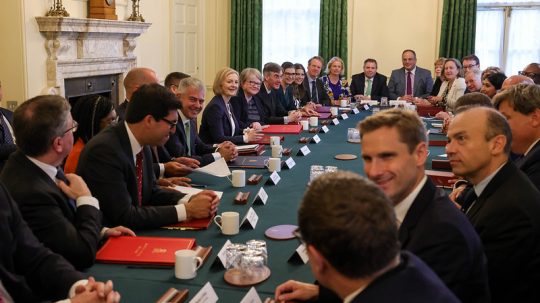Chancellor Kwasi Kwarteng confirmed yesterday that public services will receive real-terms spending cuts of £18bn a year, despite the government’s U-turn on scrapping the top tax rate for the highest earning 1% on Sunday evening. He told BBC Radio 4 that the government would stick with spending plans for government departments made in 2021, despite inflation soaring to 10%.
Asked if he would curb spending, Kwarteng said that he would stick to the government’s 2021 Comprehensive Spending Review (CSR), confirming that public spending would not rise in line with the current inflation rate. This is despite a package of tax cuts announced as part of the chancellor’s ‘mini-budget’ on 26 September, which caused the pound to plunge to its lowest level since 1985.
The plan to cut the 45p tax rate, now reversed, was expected to cost the taxpayer £2bn. But other tax promises, such as cancelling the planned rise in corporation tax and national insurance contributions, would still amount to £43bn in increased borrowing, according to the Institute for Fiscal Studies (IFS).
Kwarteng's "£45bn package of tax cuts has now become a £43bn package – a rounding error in the context of the public finances."
"He still has a lot of work to do if he is to display a credible commitment to fiscal sustainability."
Our full statement> https://t.co/2ORqDpJo0q pic.twitter.com/7onUEs1kdi
— Institute for Fiscal Studies (@TheIFS) October 3, 2022
Paul Johnson, the director of the IFS, said on Monday the U-turn had little impact on fiscal sustainability. He said: “Unless he [the chancellor] also U-turns on some of his other, much larger tax announcements, he will have no option but to consider cuts to public spending: to social security, investment projects, or public services.”
The IFS found that £18bn additional funding would be needed each year to “restore” public service spending plans to the same level in real terms as when the CSR was published. The cut in corporation tax, a tax on businesses’ profits and assets, amounts to £18.7bn in borrowing each year.
Austerity and human rights
The UN’s former poverty envoy found that public sector cuts introduced by Conservative prime minister David Cameron in 2010 violated human rights in the UK. Philip Alston, the UN’s rapporteur on extreme poverty and human rights, said in 2018 that spending and welfare cuts breached four UN human rights agreements that the UK has signed. This included the International Covenant on Economic and Social Rights (ICESR), which states that countries should spend the “maximum available resources” to safeguard rights, such as the right to health, education and an adequate standard of living.
In 2019, in his final report to the Human Rights Council, Alston said: “Considering the significant resources available in the country and the sustained and widespread cuts to social support, which have resulted in significantly worse outcomes, the policies pursued since 2010 amount to retrogressive measures in clear violation of the country’s human rights obligations.”
Alston highlighted that citizens were no longer able to access vital services they needed because of cuts to public spending, from public spaces like libraries for whole communities to frontline services relied upon by the most vulnerable.
Before the Covid-19 pandemic, councils had had to cut 63% of their budgets, which meant spending on social care for the over 65s fell by 31%, according to the IFS. It found that this caused an increase in admissions to A&E, while Age UK found that record numbers of older people were going without support they needed because of cuts.
Following last month’s mini-budget, government ministers have been told to expect to make “efficiency savings” in departments. On Monday, Paul Scully, minister of state at the Department for Levelling Up, Housing and Communities, indicated in remarks to the Local Government Chronicle that there could be further cuts to local government budgets.
Welfare cuts
Cuts might also take the form of reductions in the welfare benefits to which people are entitled, hitting some of the least well-off hardest.
Under previous coalition and Conservative governments, cuts to welfare, such as the benefit cap and two-child limit, were found by the IFS and the Joseph Rowntree Foundation to have increased child poverty.
Treasury secretary Chris Philp refused on 28 September to confirm that former chancellor Rishi Sunak’s promise for a one-off increase in welfare payments to offset inflation would still happen next April. It has sparked fears that cuts to benefits, such as Universal Credit, could leave some unable to pay rising energy bills, food costs and rent.
The chancellor has committed to publish the government’s medium-term fiscal plan, which would outline its spending plans, on 23 November.





